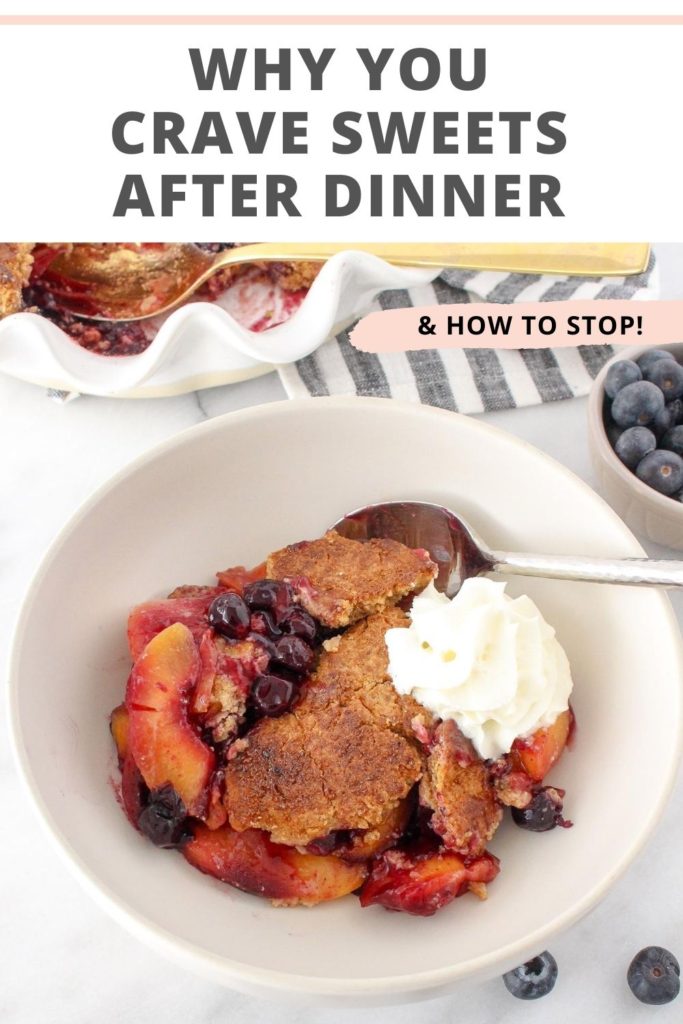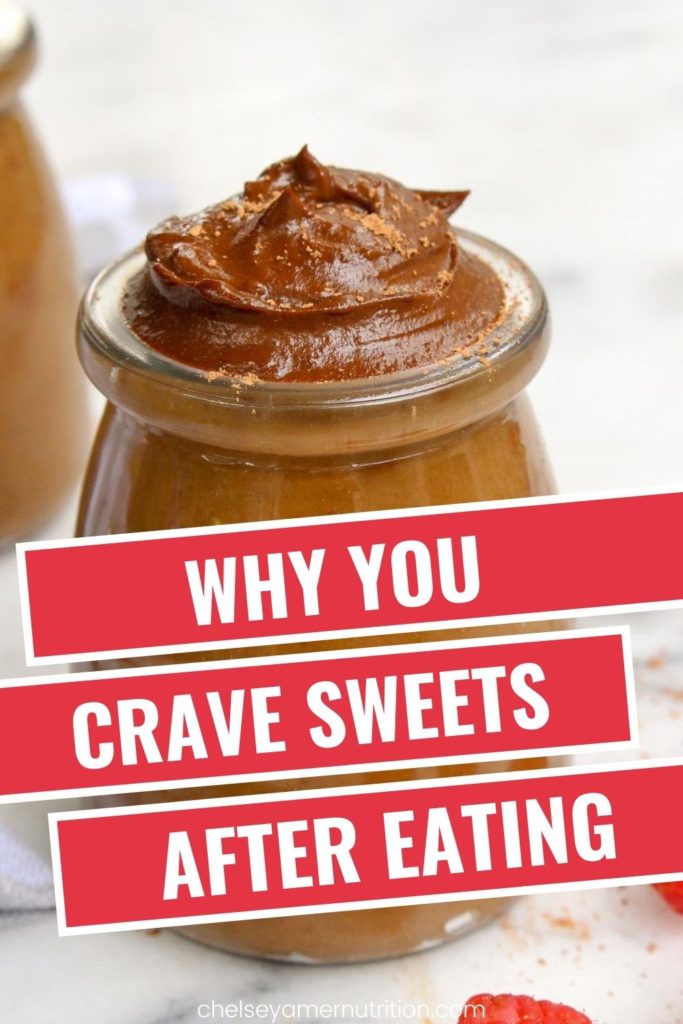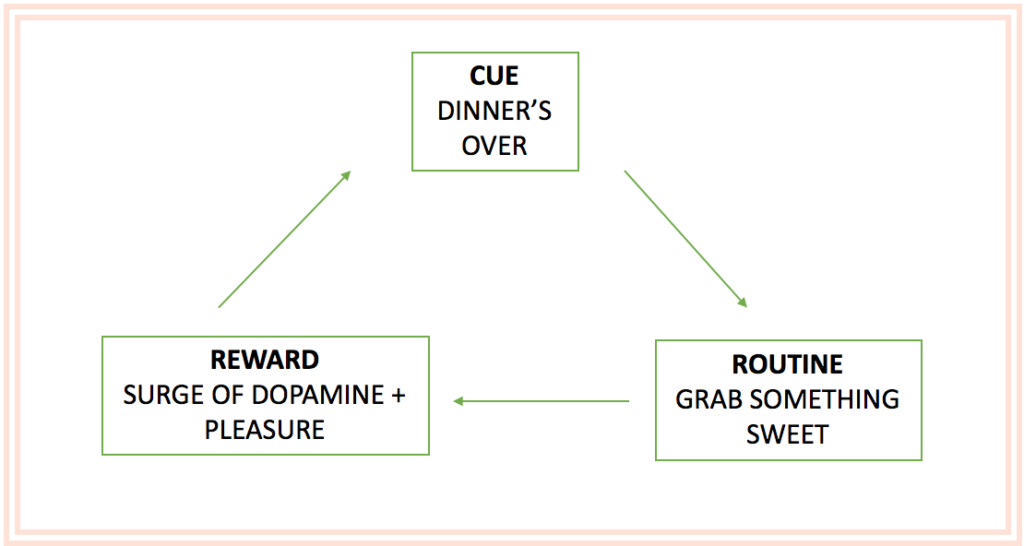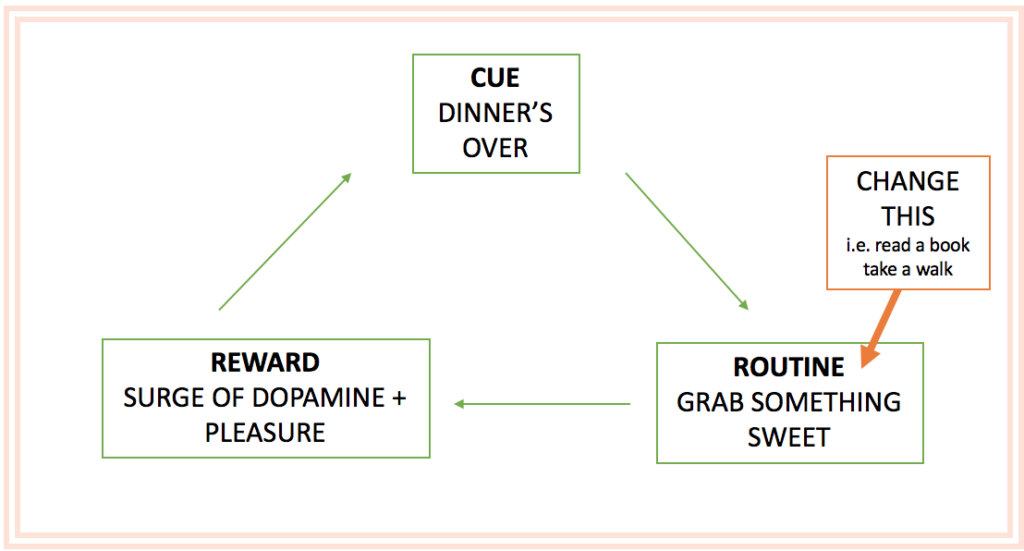Why You Crave Sweets After Dinner (& how to break this habit!)
One of the most common questions I receive is “Help! I crave sweets after dinner every night! What can I do about this?” Today I’m breaking it down and sharing why you crave sweets after dinner, plus sharing tips to help you figure out what to do about it!

A common thread I hear from many of my 1:1 clients and Nutrition Training Program students is the internal struggle of sweet cravings after dinner.
Hey, I’m human, I get it!
It can be really tough to stop sweet cravings after a meal because it’s 100% NORMAL to crave something sweet after a meal.
I repeat, it’s 100% normal to crave sweets after dinner (or any meal!). But if you feel out of control… that’s another story.
Go from mindless snacker who often overeats & feels out of control around food to a confident and balanced eater, without dieting, with the Binge to Balanced Guidebook.
For many of us, eating something sweet signifies the end of a meal. It provides the closure we’re looking for.
There are a few reasons why you may crave sweets after dinner (or any meal):
1 . It’s PHYSIOLOGICAL – Digestion is hard work!
Your body craves sweets as a way of getting a QUICK spike of energy to support the digestive process.
Digesting your food is hard work! Your body burns calories (or energy) while digesting your food. This is called the Thermal Effect of Food (TEF) – a subject for a whole other blog post.
It’s important to recognize that your body uses energy to help you gain more energy from your food. In fact, 3-30% of the total calories contained in a food can be used digesting that food (it’s towards the higher end for proteins and lower end for carbs and fats).
2. It’s PSYCHOLOGICAL – Craving sweets after a meal is a HABIT.
For most of you reading, this is the more likely reason that you’re craving sweets after dinner!
Somewhere along the way you fell into a HABIT of consistently eating something sweet after a meal. Now, your body is programmed to crave something sweet after a meal… but this isn’t necessarily a bad thing!
To determine if this is a habit you want to break, ask yourself:
- How does eating sweets so often make me feel?
- Does eating sweets frequently fit into my goals?
If eating dessert or sweets after every meal leaves you feeling sluggish, bloating, and blah, you may want to consider re-writing your routine to break this habit (more on this below).
But if you feel 100% satisfied and energized, there’s no need to change this habit!
So this may beg the question: Am I eating too much sugar?
If you have an otherwise well-balanced diet and fill your plate with plenty of veggies, protein, healthy fats, and high fiber carbs *most* of the time, then you’re likely not going to over-consume sugar.
Remember, when you restrict sugar you’ll crave it more! (You can read more about that HERE!)
Needless to say, the 2015-2020 Dietary Guidelines for Americans recommend consuming less than 10% of your total daily calories from added sugar. The 2020 Dietary Guidelines Advisory Committee recommend reducing this even more to 6% of your total daily calories to come from added sugar.
So yes, reducing your added sugar intake is important, but it’s also important to satisfy your cravings to avoid over-eating at another time.
However, if you’re generally craving “something sweet” and it’s not very specific, you may be satisfying a HABIT more than a craving.

How to break the habit of eating sweets after dinner
There are 3 steps to break the HABIT of why you crave sweets after dinner:
- Examine if your after-dinner sweet cravings are a habit or a true craving
- Identify the cue, routine, and reward of your habit
- Disrupt your routine
Here’s what I’m talking about…
First, examine your behavior.
For a few days, notice how you feel after dinner. As soon as you clean up dinner does your sweet craving kick in? Or is it 30 minutes later when you’re watching TV?
Are you clearly identifying a specific sweet you want to eat after dinner or is it a more generalized desire for something sweet?
If you cannot locate exactly what sweet you want to eat after dinner, this is likely a HABIT, not a craving.
If you have an after dinner sweet HABIT, you can disrupt this habit if it’s interfering with your goals, energy, and health.
But as a reminder, most individuals don’t need to skip their after-dinner sweet treat for the sake of their health. A daily piece of chocolate can fit into an otherwise well-balanced, healthy diet.
Second, identify what triggers your habit.
Habits are psychologically constructed routines that are instigated by certain cues and lead to certain rewards.
If you crave sweets after dinner, for example, finishing dinner (the cue) “cues” you to eat sweets (the routine), and leads to a reward (a boost of feel good hormones in your brain that occurs from eating sweets, for example).

The reward may differ based on the reason you crave sweets after dinner. For example, if you under-eat during the day, you’re likely craving sweets to receive a reward of energy (aka calories). If you enjoy the serotonin and dopamine (feel good neurotransmitters in your brain) boost after eating sweets, then that’s your reward. It’s important to identify your reward because the reward must stay the same when interrupting your habit loop.
Researchers say that to disrupt a habit, you must interrupt the ROUTINE.
This is the hardest part. Habits are engrained in your brain, so disrupting a habit isn’t so easy!

If your routine is to grab a piece of chocolate or an ice cream bar immediately after dinner, perhaps you interrupt your usual dessert routine by going for an after-dinner walk, doing the dishes, reading the mail, knitting a scarf… or anything else!
At first, it will be very difficult to “force” yourself to do another behavior. Over time, you’ll be able to rewrite your routine and therefore disrupt your habit.
It is important that your cue (eating dinner) and the reward (a serotonin boost, for example) stay the same. I highly suggest re-writing your routine with a pleasurable activity (i.e. not paying the bills!).
Other Factors to Consider ….
Of course there may be other modifiable factors that influence why you crave sweets after dinner.
If you’re wondering why you crave sweets after dinner, you may want to consider…
- Are you eating enough during the day? Your hunger hormones (i.e. ghrelin) will know if you don’t and begin screaming… which can increase your sweet cravings!
- Are you eating a balance and variety of nutrients (carbs, protein, and healthy fats)? A balanced plate promotes SATISFACTION, which helps cut cravings!
- Do you give yourself permission to eat sweets?
- Do you give yourself permission to eat sweets at ANY time of day? What if you’re craving something sweet at breakfast or after lunch? Pushing it off will only heighten your craving!
- Are you STRESSED? Stress will also increase ghrelin, your hunger hormone, so be sure to take steps to minimize your stress!
- Lacking sleep? Another factor to increase ghrelin!
- Are your meals satisfying?
- Are you REALLY giving yourself unregulated permission to eat what you want, when you want it? I promise you… practicing permission to eat what you want when you want it will drastically reduce your sugar cravings!
Unsure how to get started breaking this habit?
Reach out and let me know how I can help!
This is also a topic covered extensively in the Nutrition Training Program!
XO



 Hi there!
Thanks for stopping by! I'm Chelsey, an online Registered Dietitian, recipe developer, budding photographer, and coffee addict! My mission is to help you feel good through food by answering the question "What should I eat?" Let's make nutrition approachable!
I hope you enjoy my personal collection of simple, healthy, food allergy friendly and nutritiously delicious recipes, plus tips and tons of tricks that will help YOU live a nutritionally-balanced life! I look forward to getting to know you better...
Hi there!
Thanks for stopping by! I'm Chelsey, an online Registered Dietitian, recipe developer, budding photographer, and coffee addict! My mission is to help you feel good through food by answering the question "What should I eat?" Let's make nutrition approachable!
I hope you enjoy my personal collection of simple, healthy, food allergy friendly and nutritiously delicious recipes, plus tips and tons of tricks that will help YOU live a nutritionally-balanced life! I look forward to getting to know you better...







